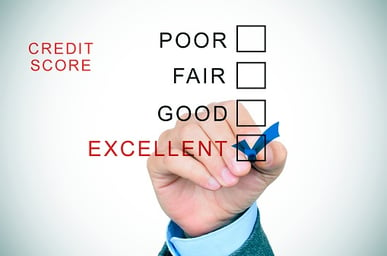Scura, Wigfield, Heyer, Stevens & Cammarota Blog
- Blog
How to Rebuild Your Credit Score After Filing for Bankruptcy
 Two of the most common questions I receive from individuals contemplating filing for bankruptcy are:
Two of the most common questions I receive from individuals contemplating filing for bankruptcy are:
How long will the bankruptcy filing remain on my credit report; and
What can I do to rebuild my credit after receiving a bankruptcy discharge?
A chapter 7 bankruptcy filing remains on your creditor report for ten years. Whereas, a chapter 13 bankruptcy filing remains for seven years. However, under chapter 13 bankruptcy, you repay a portion of debt owed for a maximum of five years. Consequently, the bankruptcy filing will be removed from your credit report sooner than a chapter 7.
Rebuilding your life following a bankruptcy can be difficult and overwhelming for many individuals. Most people are concerned of how they are going to repair their credit score. However, if you play your cards right, it’s easier than you may think.
While it’s true that you should not expect a high credit score following bankruptcy, if you manage your credit properly, it’s possible you could have a 700 score or higher (depending on credit score pre-bankruptcy) in as little as 4 years.
Here are a few tips that could help you reach a high credit score following a bankruptcy discharge.
Know your credit score
First things first, know your credit score. Review your credit report and clear any errors. Check that your credit reports (ie. TransuUnion, Equifax, and Experian) have accurately recorded your pre-bankruptcy debts as included in the bankruptcy. Under the Fair Credit Reporting Act, you have the right to dispute inaccuracies. You can review your credit report for free at www.annualcreditreport.com.
Make timely payments on reaffirmed debts
If you agreed to reaffirm debts in your bankruptcy, such as a car loan, mortgage loan, or if you have non-dischargeable debts, such as a student loan, you can use these debts to rebuild your credit. Make payments before the due date and always make at least the minimum payment. If you can pay more than the minimum, do so. Your payment history makes up 35% of your credit score.
Get a secured credit card
Following your bankruptcy discharge, you’ll receive credit account offers, but they’ll generally include higher fees and interest rates. Your best bet is to acquire a secured credit card and start making regular, on-time payments. Secured credit cards use a secured account as collateral for the credit limit and are easier to be approved than a standard credit card. The bank will likely provide a credit card line that’s 50% to 100% of the deposit.
Get a gas or retail credit card
Consider getting a gas card. If you drive, you’ll have to purchase gas. Make necessary purchases work for you. Gas cards typically don’t require applicants to have good credit. This suggestion works for retail cards as well.
Open a new checking or savings account
Consider opening a new checking and savings account. Creditors look for bank accounts as a sign of stability. A savings account improves your standing with creditors and will make them trust you.
Consider buying a home after a few years
As early as 1-2 years after filing bankruptcy, you may be able to receive a home loan. Governmental agencies such as the Federal Housing Administration (FHA) and Department of Veteran Affairs (VA) have specific guidelines for accepting borrowers who have filed for bankruptcy.
Understand your financial limits
Make sure you understand your financial limits and to keep up with your balances. Make a budget and stick to that budget. This shows future lenders that they can depend on you to pay what you borrowed. Also make sure that you save for any potential emergencies.
Avoid closing credit accounts
Closing accounts reduces the amount of credit you have available to you, which could potentially lead to lower credit scores.
If you have additional questions about bankruptcy and how bankruptcy will affect your long term financial planning, please contact us and we’d be happy to answer any questions you may have.
Make sure to also check our firm’s blog section, including “Steps Involved in the Chapter 7 Bankruptcy Process Explained” and “Frequently Asked Questions that You Always Wanted to Know in a Chapter 13 New Jersey Bankruptcy.”

Guillermo J. Gonzalez
NJ Attorney with extensive experience on Bankruptcy Law Real Property Law, Litigation, and Immigration Law. Dedicated Associate Attorney at Scura, Wigfield, Heyer, Stevens, & Cammarota LLP.
Share Article
Need Help? Contact Us Today!





Lists by Topic
- Bankruptcy (320)
- Personal Injury (95)
- Chapter 13 (52)
- Chapter 7 (50)
- Debt Management (50)
- Foreclosure (47)
- Accident (32)
- Car Accident (26)
- Chapter 11 (24)
- Business Bankruptcy (19)
- Credit (18)
- Insurance Claims (17)
- Business Law (12)
- Litigation (12)
- Employment Law (11)
- Probate and Estate Law (11)
- Damages (10)
- Medical (10)
- Product Liability (10)
- Workers Compensation (10)
- Attorney (9)
- Consumer Bankruptcy (9)
- Commercial & Residential Real Estate (6)
- Slip and Fall (6)
- Contracts (5)
- Premises Liability (5)
- Repossession (5)
- wrongful death (5)
- Video | Bankruptcy (4)
- Bankruptcy Cost (3)
- Corporate Litigation (3)
- Trial Law (2)
- student loans (2)
- tax (2)
- Attorney Fees (1)
- COVID-19 (1)
- Certified Civil Trial (1)
- Dog Bites (1)
- News (1)
- Relocation Assistance (1)
